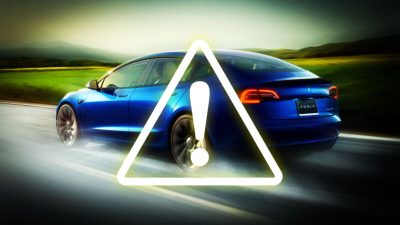Eight-car Thanksgiving Pileup Blamed on Tesla “Full Self-Driving” Software
California Highway Patrol say only Tesla knows if the system was active.

All Global Research articles can be read in 51 languages by activating the Translate Website button below the author’s name.
To receive Global Research’s Daily Newsletter (selected articles), click here.
Follow us on Instagram and Twitter and subscribe to our Telegram Channel. Feel free to repost and share widely Global Research articles.
***
An eight-car collision on Thanksgiving Day (Nov. 24) is now being blamed on Tesla’s “Full Self-Driving” (FSD) assistance system. The crash took place in the Bay Area in California on I-80 and left one person hospitalized and eight others with minor injuries.
According to Reuters, a California Highway Patrol report on the incident says that a Tesla Model S traveling on I-80 at 55 mph crossed several lanes of traffic and then slowed abruptly to just 20 mph, at which point it triggered the crash as other cars still traveling at highway speed had no chance to avoid the slow-moving electric vehicle.
An eight-car collision on Thanksgiving Day (Nov. 24) is now being blamed on Tesla’s “Full Self-Driving” (FSD) assistance system. The crash took place in the Bay Area in California on I-80 and left one person hospitalized and eight others with minor injuries.
According to Reuters, a California Highway Patrol report on the incident says that a Tesla Model S traveling on I-80 at 55 mph crossed several lanes of traffic and then slowed abruptly to just 20 mph, at which point it triggered the crash as other cars still traveling at highway speed had no chance to avoid the slow-moving electric vehicle.
As Tesla expanded its beta program for FSD, the system has been implicated in more and more crashes, and in late 2021 the automaker had to issue a recall for cars running firmware linked to so-called “phantom braking” events, where bad software inappropriately triggered the cars’ automatic emergency braking systems.
That’s just one of a litany of problems associated with Tesla’s assistance systems—which have spawned at least 38 NHTSA investigations by this summer, according to Electrek. Ire directed towards FSD and Tesla’s attitude towards deploying the system on public roads even led to a senate candidacy this year.
FSD is an important revenue stream for Tesla. Earlier this year, CEO Elon Musk told investors that it “will become the most important source of profitability for Tesla,” and the company has repeatedly increased the price of the software package, which now costs $15,000.
Originally, access to the beta software was by invitation only, and using it depended upon maintaining a high score in a driver-monitoring system. But Tesla opened the beta up to any car with the right hardware on the same day as the eight-car crash.
*
Note to readers: Please click the share buttons above. Follow us on Instagram and Twitter and subscribe to our Telegram Channel. Feel free to repost and share widely Global Research articles.

